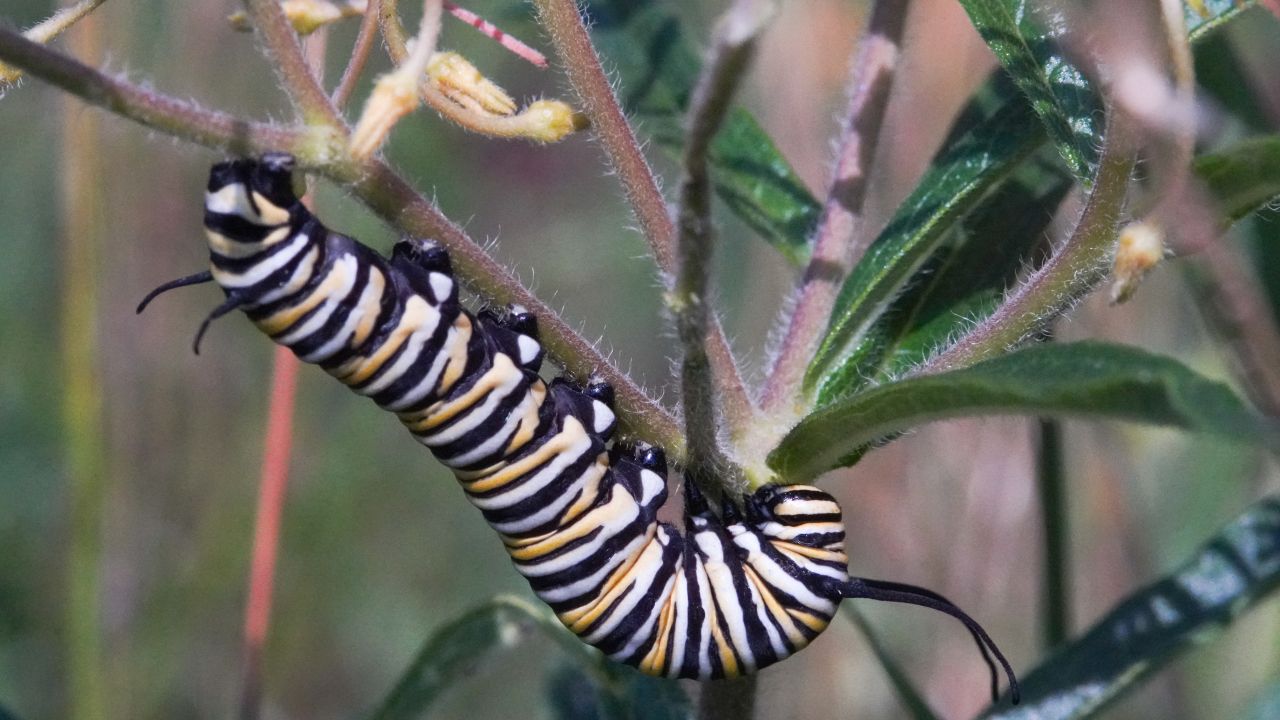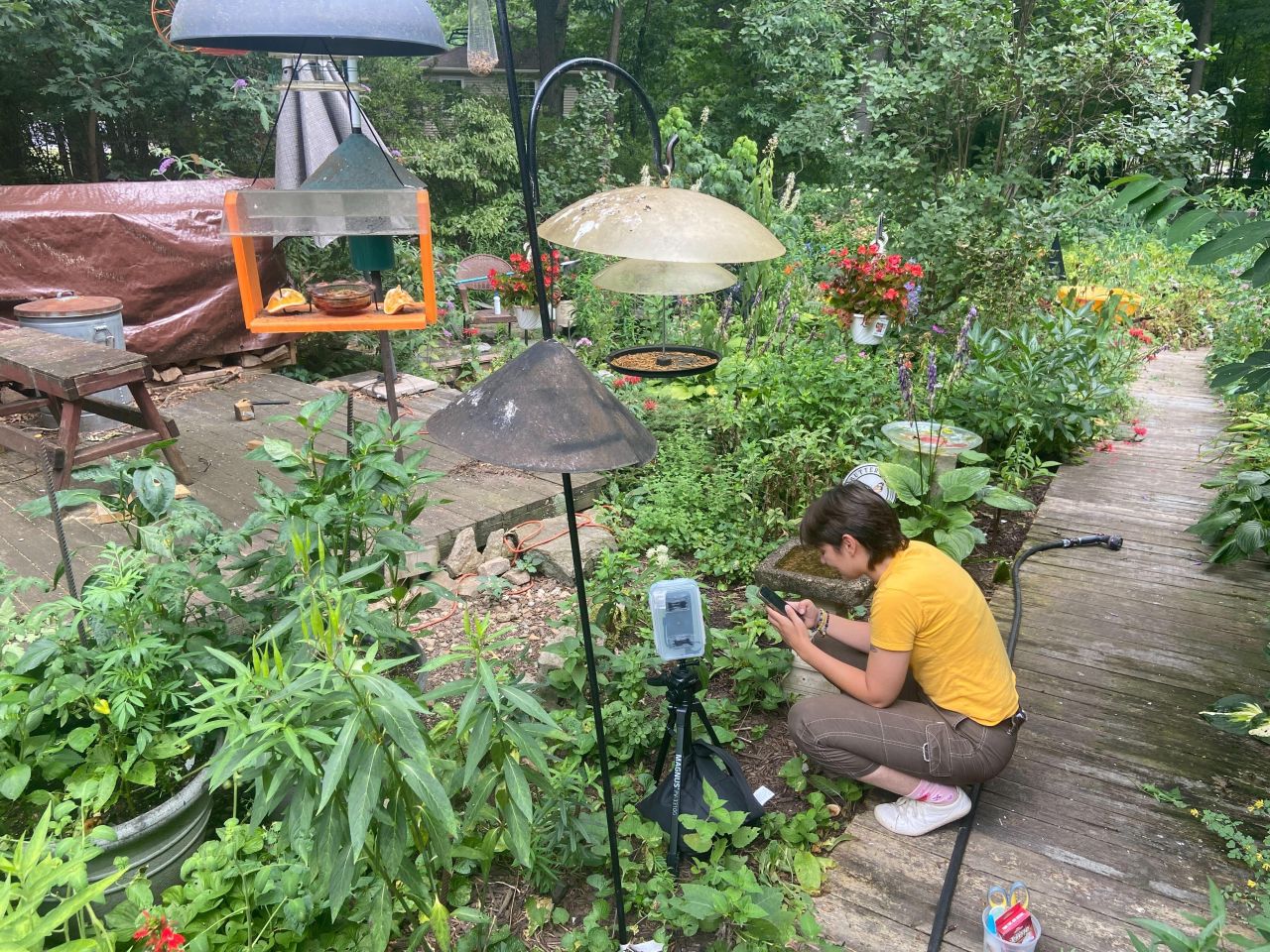December 01, 2024
Student Spotlight on Sophia Mucciolo: Where Did That Monarch Butterfly Go?

Gardeners often wonder why monarch butterflies are becoming rarer in their gardens. The answer may lie in the delicate balance of their lifecycle. Monarchs rely on milkweed not only for nectar but also for laying eggs and feeding their caterpillars. Despite efforts by gardeners and conservationists to plant milkweed, monarch caterpillars often mysteriously disappear, leaving many questions unanswered.
Over the past 20 years, monarch populations have declined by nearly 80%. In response, Sophia Mucciolo, a rising second-year Ph.D. student in Ecology, is on a mission to uncover the mysteries behind the disappearance of these caterpillars. Using video surveillance, she meticulously observes monarch behavior in private gardens, aiming to identify threats like disease and predation that may be contributing to their decline.
“Video surveillance will help us to see what is happening to the caterpillars. After collecting footage, we need to go through the videos, which can be really time-consuming. My goal is to develop a computer vision algorithm that will sort through the video and isolate important events, like a caterpillar getting eaten. This way, we can monitor many caterpillars to get a good idea of what is happening to them in gardens,” explains Sophia.
Sophia completed her undergraduate degree in Biology at Penn State, working in the Entomology Department before staying for graduate school. Now, she focuses on monarch butterflies, a project she finds enjoyable despite its challenges. In her study, Sophia cultivates milkweed directly in private gardens, tying the caterpillars to each leaf with fishing lines. She places a camera on each leaf to closely observe and document their interactions with the garden environment, aiming to understand how these natural settings impact their survival. Sophia's hypothesis is that different garden environments may impact the survival of monarch caterpillars, potentially due to varying exposure to predators, diseases, or suboptimal growth conditions. By carefully monitoring these environments, she aims to identify the key factors affecting caterpillar survival, which could lead to more effective conservation strategies for monarch butterflies.
Pioneering Habitat Influence Research
Remarkably, Sophia's study is the first of its kind to explore how garden habitats influence monarch behavior and survival. Her work will shed light on the delicate balance required to support these majestic insects and offers invaluable insights into their conservation.

Bridging Disciplines for Better Monitoring
Sophia's vision extends beyond traditional entomology. She seeks collaboration with engineers to develop innovative monitoring technologies, enhancing our ability to study and protect insect populations. As a trainee in the INSECT-NET graduate training program, Sophia hopes to advance her research through an interdisciplinary approach. This collaborative effort promises to revolutionize how we understand and conserve not just monarch butterflies but a myriad of insect species facing similar threats.
Join the Journey
Sophia's research is more than a scientific endeavor; it's a call to action for anyone passionate about preserving our natural world. If you're an engineer, your technical skills could help develop better monitoring tools. If you're a gardener, consider planting milkweed or creating butterfly-friendly habitats in your garden. Your involvement can directly contribute to the survival of monarch butterflies. Let's support Sophia in her quest to protect these iconic beauties and ensure they continue to grace our gardens for generations to come.
______________
Sophia Mucciolo is a Fellow in the INSECT NET program and a Ph.D. student mentored by Professor Sara Hermann in the Ecology Graduate Program and Department of Entomology at Penn State. Her research is also supported by funding from the Huck Institutes of the Life Sciences at Penn State.
This article was written by Yanqiu Yang, a Fellow in the INSECT NET program and a PhD student mentored by Professor Paul Heinemann in the Department of Agricultural and Biological Engineering at Penn State. It was prepared as part of the INSECT NET Science Communication workshop series coordinated by Drs. Christina Grozinger and Natalie Boyle in summer 2024.
